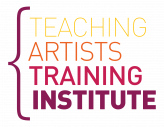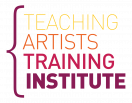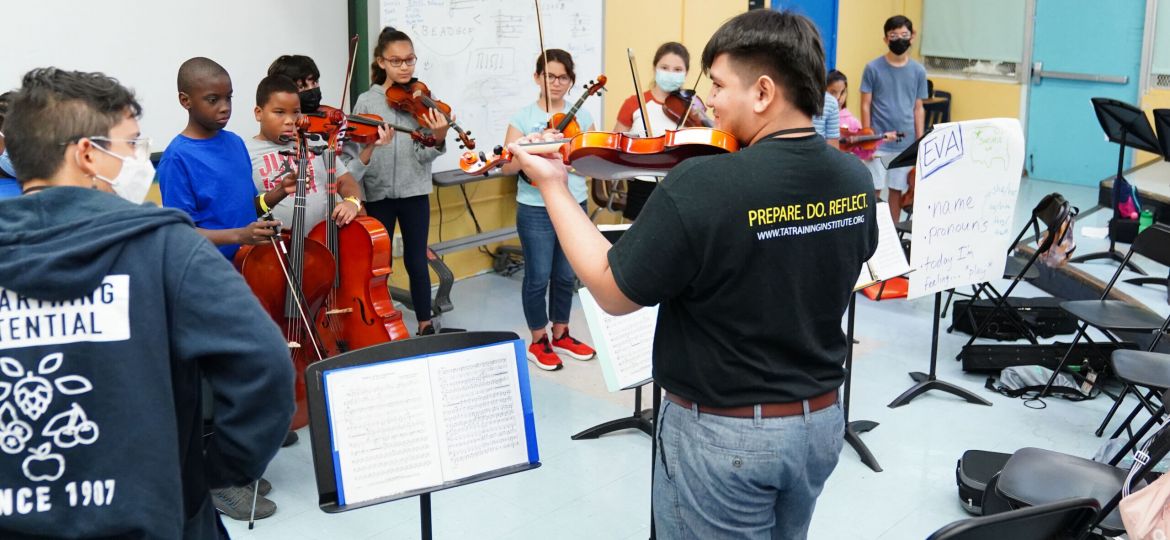
What is your teaching Philosophy?
As teachers, most of us know the why behind our choice to step into a classroom and take on the influential role of teacher. We may be driven by a desire to share our own positive experiences of learning music, or perhaps want to shift the status quo to provide opportunities that were not available to us as children. However, knowing our why is just the beginning to defining a full Teaching Philosophy.
According to Jessica Zweig, Director of Educational Programming at Play On Philly, a Teaching Philosophy is “the personal compass for guiding your reasons and truths about your practice.” A Teaching Philosophy can take many forms, including descriptive, narrative, or even a drawing, but should always remain rooted in your personal core values.
Read on to hear from current TATI Lab Cohort members as they share their own Teaching Philosophies, and perhaps spark inspiration to put your own Philosophy into writing.
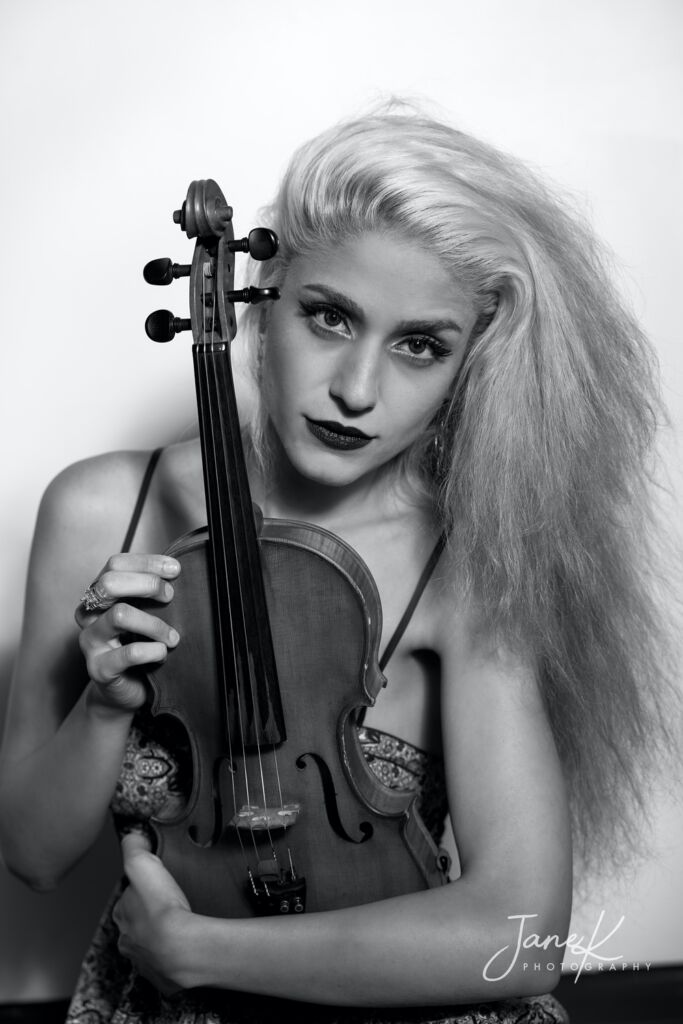
The Triangle of Teaching
By Negar (Dena) Afazel, Violin Teaching Artist, Kalamazoo Kids in Tune
I view my teaching philosophy through three defined lenses: learner, performer, and teacher.
Like the prongs of a triangle, these lenses unify my values and beliefs, while also representing the change and fluidity that is present within the triangle as a whole.
Each prong of my teaching triangle is inseparable from and incomplete without the other two. The triangle stands strong because each of these values are weighted equally and distributed evenly, creating balance in my own identity as a teacher. Like myself, I believe that my students are not only learners, but also reflect the identities of performers and teachers.
As a learner, I believe…
- We are all different, and have our own best ways of approaching and defining the learning process.
- Learning should be an exhilarating process. It’s as exciting as finding new pieces of a puzzle.
- We all have longing for growing through diverse and empowering learning contexts.
- The mind has no limits for growth. We should surf the never-ending horizons.
As a performer, I believe…
- In the strong connection between ‘tradition, innovation, and collaboration’.
- I need to be transparent about my beliefs and the thoughts behind my work.
- I should share my stories through my music.
- That without a healthy body and mind, I won’t be able to sustain my performance practice.
As a teacher, I believe…
- Music should be taught as a practiced form of expression, acceptance, and freedom.
- In respecting creativity and innovation of any kind.
- We need to explore resilience through creativity.
- Competence and being one’s self are the truest sources of effectiveness.
- In building a team based on the principles of equality, equity, access, and inclusivity.
- In devotion to collaboration and creating an anti-power struggle environment.
- In nurturing a special attention to love and the power of embracing each other as who we are.
- In building a learning environment that represents the world we want to live in.
Through my role as a teacher, I am also a constant learner and performer. I believe that my students also hold all three roles. As I share my experiences, I communicate with them and am constantly curious about their intuitions. Together, we create a never-ending give-and-take process which I believe is the essence of making music!
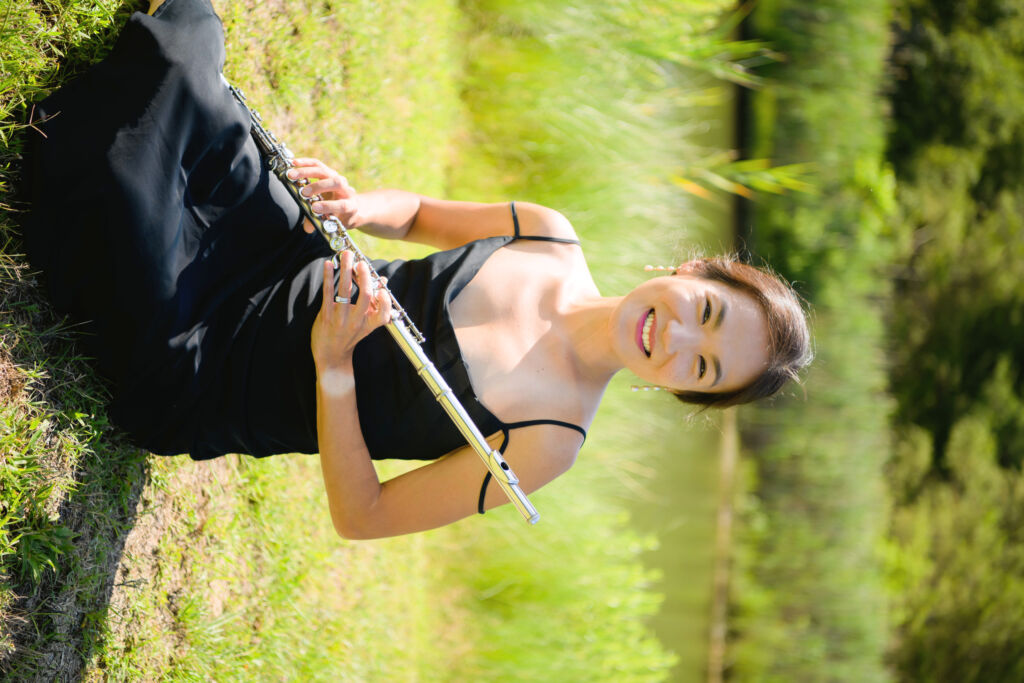
The Art of making sourdough
By Gloria (HyeWon) Huskey, PreK Musicianship Teaching Artist, Baltimore Symphony Orchestra's OrchKids
Music is an empowering and transformative force for individuals and their communities. Being armed with the knowledge and skills to lead others to music has ultimately led me to become a teacher.
I like to think of my reason for teaching through the analogy of making sourdough bread. In order to make this tasty and nutrient dense bread, you need a “starter”, made with flour and water, which is “fed” to keep the dough alive and help it mature. That starter is me, the teacher. I started somewhere with simple ingredients and I was nurtured by my surroundings and environment which molded me into who I am now as a person, a teacher, and a musician. In order to support and grow the dough, the starter literally has to share a part of its being. It must depart its container to give life to the dough that is about to be baked.
I want to be that starter for my students. I want to give and share the knowledge and skills that I have been fed and grown with so that I can mix, rise, divide, stretch, rise again, grow, and be shaped alongside my students to create something wonderful.
As a teacher, I believe in:
- Being an observer and facilitator.
- Being a co-learner to explore, engage, and discover with my students.
- Being a mentor and a guide, not limiting myself as a “music” teacher, but a person who students can wholeheartedly trust.
- Being entirely present (physically, emotionally and mindfully) to my students’ learning so I can genuinely build student-centric, culturally responsive lessons.
- Fostering creativity and nurturing my students’ innate musicality.
- Discovering and trusting in the capabilities of each of my students.
- Planting joy and the pleasure of making music.
- Motivating students to want to learn and enjoy the process of learning.
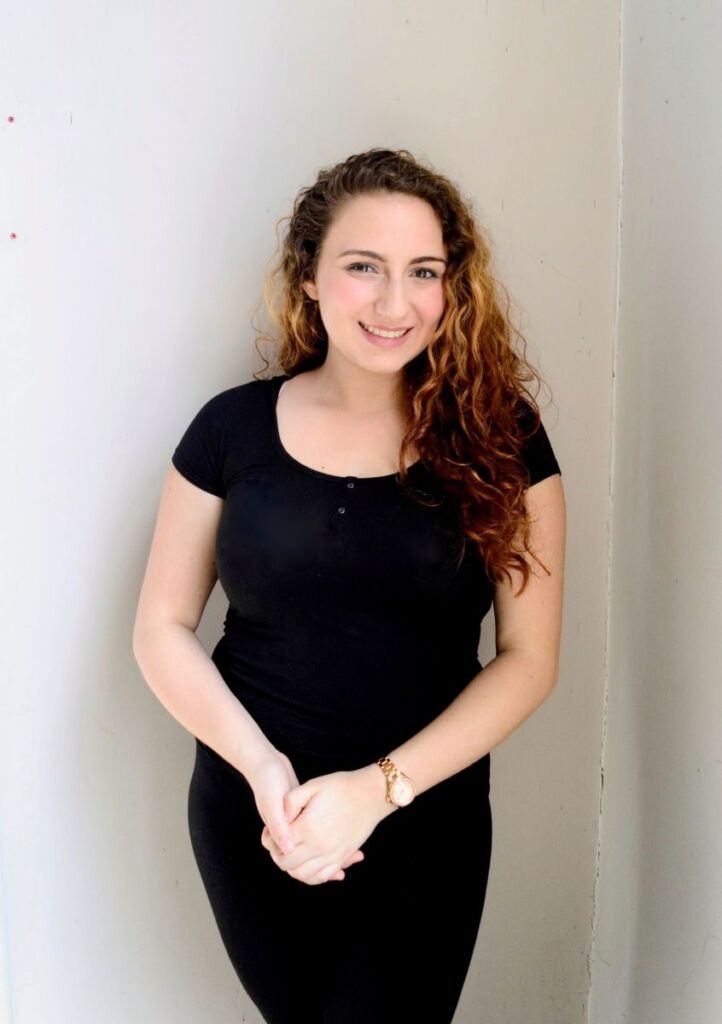
Robins and Blackbirds: Building Success in the Choral Classroom
By Ariel Zaichick, Choral Teaching Artist, Sistema Kingston
I believe that all students are capable and all students can attain success through positivity, consistency, and encouragement. I once read an article outlining a man’s childhood choir class experience. His teacher told the class that there are two types of singers in choir class, the robins, who can sing, and blackbirds, who should mouth the words for the greater good of the choir’s sound. For the rest of his life, this man, who was assigned the role of “blackbird”, never sang again. Unfortunately, there are countless stories of adults who believe they should not sing, either because they were told as children that they were “tone deaf”, or simply told they were not capable of singing. I believe there are no “robins and blackbirds”. All students have a unique and beautiful voice and the capability of creating wonderful music. With proper modeling, support, and use of the full vocal range, all students can, will, and should, sing.
Success is my highest teaching value, as the feeling of accomplishing a job well done is something that students take with them outside the classroom and into their everyday lives. Distributing positive affirmations goes hand in hand with the exhibition of success. Being told that you are good, that you are valued, and that you are capable triggers a chemical response in a student’s brain that improves their overall well-being through consistent love and positivity from a safe and trusted source.
Success alone is not a reliable source of measurement for student progress and cannot be defined solely by artistic aptitude. I believe that any form of improvement, student dedication, or even the exhibition of joy in the artistic process is a sign of a successful learning experience. Success should be considered on a personal, tailored scale for each student and encouraged through their learning experiences.
Creating engaging, enjoyable lessons is extremely important to me. If a student is not having fun, how can they possibly grasp and retain content? This does not mean lessons need to be exclusively games and movement, but laughter, support, and the encouragement of working and learning as a team will keep the class focused and learning. I know that if I am enjoying the process, exhibiting kindness and sharing my love of music, my students will follow.
